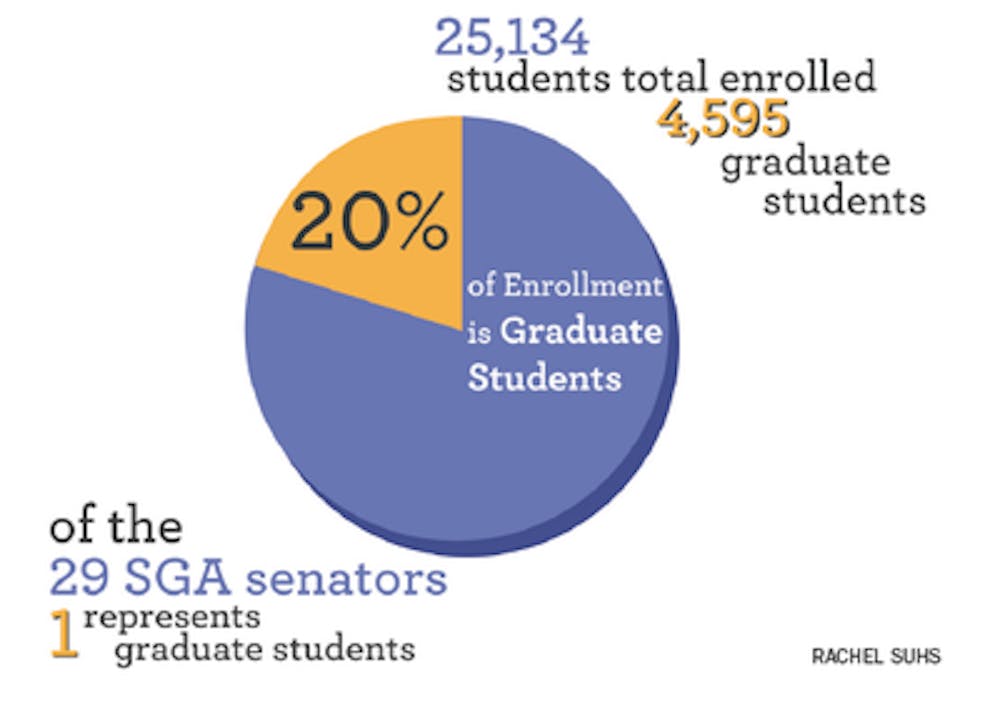Graduate students who normally have access to the Recreation and Wellness Center were denied use of the facilities.
David Adams, graduate school senator and GTA in political science, said he received calls about the incident right away.
"I heard about it from a number of graduate students," Adams said. "I want to make sure we're not overcwharged or underserved."
Nicholas Head, Campus Recreation's marketing coordinator, said the incident was not the fault of the Recreation and Wellness Center and it has a simple explanation.
"The only thing we know is we got sent a file which updated the system." Head said. "No one at the facility was responsible for the error."
Head said he did not know the specifics of the glitch beyond its link to the update.
Repeated attempts to reach Jennifer Jarvis, director for Campus Recreation, were unsuccessful.
Adams said some graduate students felt the 12-hour lapse in access was indicative of things to come.
"From what I gather, the Wellness Center asked for a full list of graduate students on assistantships," Adams said. "A computer glitch is a computer glitch, but when you ask for a list of names it seems targeted."
Michael Reynolds, executive director of Student Financial Services, said the Recreation and Wellness Center did ask for a list of students who were and were not assessed the wellness fee.
"The Wellness Center is who it originated from, but it is not uncommon to see where money is being distributed from," Reynolds said.
Reynolds also said $598 fees, including a $200 wellness fee, are built into tuition.
"A regular graduate student, just like a regular undergraduate student pays these fees," Reynolds said.
Reynolds said these fees can be waived in the case of scholarship for undergraduates and assistantship for graduate students.
"What you have is foregone revenue for the University," Reynolds said.
Adams said a theory with some traction among graduate students is Auburn plans to charge graduate students $50 per month beginning in the spring semester, the same amount faculty members are required to pay.
"We make a lot less than full faculty," Adams said.
Reynolds said nothing has been decided, there has been no new policy created and it is unlikely there would be a change in policy in the immediate future.
"That is not in effect at this time," Reynolds said. "It is highly unlikely to be in effect in Summer."
Reynolds said students whose fees have been waived can access the Wellness Center.
"The board would decide what fees need to be (waived)," Reynolds said. "I can't add arbitrary fees."
Some of the $598 registration fee also pays for services such as transit, student activities, the Student Center and its operation.
Adams expressed concern students whose fees have been waived could also eventually be charged for those as well.
"You could put a card scanner on the door of a bus," Adams said. "How much is enough and when would it stop?"
Frank Sturm, president of the Graduate Student Council, said he wants the Recreation and Wellness Center issue to serve as a jumping off point for more open discussion about policy related to graduate students.
"This is not the only instance," Sturm said. "One of my hopes is to promote a more transparent discussion on broader roles."
George Flowers, dean for the Graduate School and Strum both said defining graduate students' broader role is tricky, because they blur the line between student and faculty.
"It's really important that graduate students have a rewarding, full experience," Flowers said. "They need to be rewarded as employees, but have the same full experience students have."
Adams, Sturm and Flowers said the amount of SGA representation for graduate students can make this more difficult.
"I feel like the voice of the graduate students is sometimes lost," Adams said.
In SGA senate, Adams is the only graduate student, and he is the only senator who specifically represents graduate students.
"Graduate students are vastly underrepresented as far as SGA is concerned," Flowers said.
Adams said he wants to improve the situation of graduate students across the board from paying for health insurance in installations to being able to use the Recreation and Wellness Center.
"Auburn wants to attract the best graduate students," Adams said. "By keeping facilities (such as) the Wellness Center open they can continue to do that."
Reynolds said he felt the issue has gotten attention because of misinformation, and stressed no changes have been made or agreed to.
Adams said he hopes it remains the case.
"I think the University should live up to its promise that the facility be open to all students," Adams said.
Do you like this story? The Plainsman doesn't accept money from tuition or student fees, and we don't charge a subscription fee. But you can donate to support The Plainsman.





